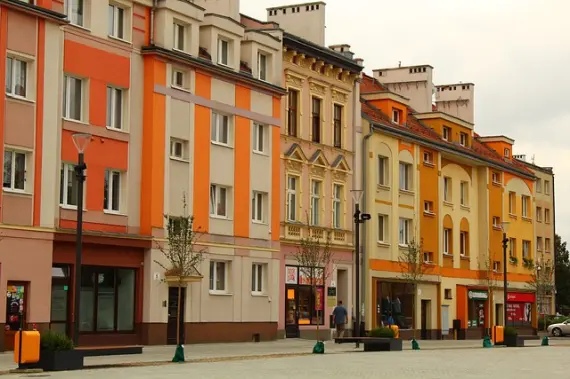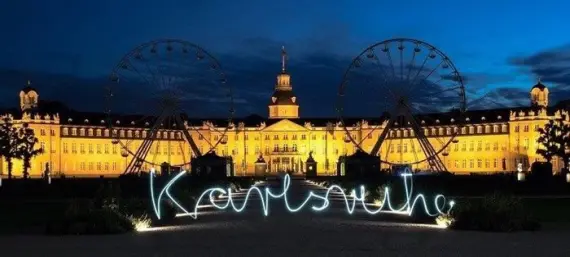Bus to KARLSRUHE from OLAWA - buy a ticket
OLAWA

Olawa is a city in Lower Silesia province, in the Wroclaw agglomeration. The town, located on the Oława (known as the Olawka) and Odra rivers, and currently home to about 33,000 residents, traces its history back to the 12th century and the Middle Ages.
The most important attraction in the city is the Piast Castle in Olawa, also known as Luisa's Palace. It was erected on the site of Prince Louis I's former Gothic hunting lodge from the late 14th century and has been rebuilt several times over the years. Olawa's town hall dates from the first half of the 19th century. On its Baroque tower, a remnant from the previous town hall, is a 17th-century figural-astronomical clock with moving figures. Inside is the worthwhile Museum Chamber of Olawa Land, a small regional museum that collects antiquities, coins and postcards from Olawa and the surrounding area, as well as a collection of militaria or exhibitions of sculptures and ceramics by local artists. Several beautiful Baroque townhouses can also be seen in the area.
It is worth taking a walk in the city park located in the southern part of Olawa along the Olawka River. There is also an old Jewish cemetery nearby with dozens of preserved matzevot. Also awaiting visitors to the city is the Sanctuary of the Blessed Virgin Mary Mother of Consolation, the oldest church in Olawa with remnants of a Gothic chancel from around 1300 and several valuable monuments of sacred art.
Getting to Olawa
The city lies 27 kilometers southeast of Wroclaw. Olawa is crossed by national road 94 and provincial roads: 396 and 455.The city has a railroad station and an Oława PKS station. The railroad connection between Wroclaw and Olawa was established as early as 1842 and is the oldest in Poland. Trains to Olawa stop at the railroad station on Szopena Street, adjacent to the city park. Oława's PKS bus station is located at 3 Maja Street and serves both intercity and international connections.
If you are interested in the description of the city and plan to visit Olawa, we invite you to take advantage of the offer of our bus rides.
Olawa is a city in Lower Silesia province, in the Wroclaw agglomeration. The town, located on the Oława (known as the Olawka) and Odra rivers, and currently home to about 33,000 residents, traces its history back to the 12th century and the Middle Ages.
The most important attraction in the city is the Piast Castle in Olawa, also known as Luisa's Palace. It was erected on the site of Prince Louis I's former Gothic hunting lodge from the late 14th century and has been rebuilt several times over the years. Olawa's town hall dates from the first half of the 19th century. On its Baroque tower, a remnant from the previous town hall, is a 17th-century figural-astronomical clock with moving figures. Inside is the worthwhile Museum Chamber of Olawa Land, a small regional museum that collects antiquities, coins and postcards from Olawa and the surrounding area, as well as a collection of militaria or exhibitions of sculptures and ceramics by local artists. Several beautiful Baroque townhouses can also be seen in the area.
It is worth taking a walk in the city park located in the southern part of Olawa along the Olawka River. There is also an old Jewish cemetery nearby with dozens of preserved matzevot. Also awaiting visitors to the city is the Sanctuary of the Blessed Virgin Mary Mother of Consolation, the oldest church in Olawa with remnants of a Gothic chancel from around 1300 and several valuable monuments of sacred art.
Getting to Olawa
The city lies 27 kilometers southeast of Wroclaw. Olawa is crossed by national road 94 and provincial roads: 396 and 455.The city has a railroad station and an Oława PKS station. The railroad connection between Wroclaw and Olawa was established as early as 1842 and is the oldest in Poland. Trains to Olawa stop at the railroad station on Szopena Street, adjacent to the city park. Oława's PKS bus station is located at 3 Maja Street and serves both intercity and international connections.
If you are interested in the description of the city and plan to visit Olawa, we invite you to take advantage of the offer of our bus rides.
KARLSRUHE

Karlsruhe is a city in Baden-Württemberg in southwestern Germany. It lies in the Upper Rhine Plain, on the Rhine, Alb and Pfinz rivers. It was founded in 1715 by the Margrave of Baden, Karl Wilhelm von Baden-Durlach. What undoubtedly distinguishes the city is its layout in the classic star-shaped layout. At the center is the palace, from which 32 avenues descend radially.
Already in the 19th century Karlsruhe was an important European scientific center. Research on electromagnetic waves was conducted there by Heinrich Hertz, and Karl Drais constructed the first bicycle in 1817. The city is home to Germany's oldest technical university.
What to see in Karlsruhe?
One of the most important sights in the city is the Renaissance palace located in the center. Its interiors now house the Baden State Museum with collections on the region and Karlsruhe itself. This castle is surrounded by an extensive park with a botanical garden and other thematic gardens, where you can have a nice rest amidst the greenery. Another museum worth visiting is the Staatliche Kunsthalle Karlsruhe, with a valuable collection of paintings by such famous artists as Rembrandt, Dürer and Cézanne, among others.
Getting there and transportation - Karlsruhe
The city is well connected - important highways such as the A5, A8 and A65 pass close by, and the French border is only about twenty kilometers away. Karlsruhe's location on the Rhine makes the city an important inland port, the fourth largest in Germany.
The city is also a major rail hub with a freight station where numerous lines converge, including those from Heidelberg to Basel and Mannheim to Rastatt. The Karlsruhe bus station is located near the city's main train station - Karlsruhe Hauptbahnhof on Schwarzwaldstrsse. Sindbad offers numerous buses to Karlsruhe - an affordable and environmentally friendly option for getting to this German city.
Karlsruhe is a city in Baden-Württemberg in southwestern Germany. It lies in the Upper Rhine Plain, on the Rhine, Alb and Pfinz rivers. It was founded in 1715 by the Margrave of Baden, Karl Wilhelm von Baden-Durlach. What undoubtedly distinguishes the city is its layout in the classic star-shaped layout. At the center is the palace, from which 32 avenues descend radially.
Already in the 19th century Karlsruhe was an important European scientific center. Research on electromagnetic waves was conducted there by Heinrich Hertz, and Karl Drais constructed the first bicycle in 1817. The city is home to Germany's oldest technical university.
What to see in Karlsruhe?
One of the most important sights in the city is the Renaissance palace located in the center. Its interiors now house the Baden State Museum with collections on the region and Karlsruhe itself. This castle is surrounded by an extensive park with a botanical garden and other thematic gardens, where you can have a nice rest amidst the greenery. Another museum worth visiting is the Staatliche Kunsthalle Karlsruhe, with a valuable collection of paintings by such famous artists as Rembrandt, Dürer and Cézanne, among others.
Getting there and transportation - Karlsruhe
The city is well connected - important highways such as the A5, A8 and A65 pass close by, and the French border is only about twenty kilometers away. Karlsruhe's location on the Rhine makes the city an important inland port, the fourth largest in Germany.
The city is also a major rail hub with a freight station where numerous lines converge, including those from Heidelberg to Basel and Mannheim to Rastatt. The Karlsruhe bus station is located near the city's main train station - Karlsruhe Hauptbahnhof on Schwarzwaldstrsse. Sindbad offers numerous buses to Karlsruhe - an affordable and environmentally friendly option for getting to this German city.
© 2026 Sindbad
Technical support, assistance, payments: Sindbad IT
© 2026 Sindbad
Technical support, assistance, payments: Sindbad IT